Hello, 40k fans! Captain Morgan, Chief Librarian of Forge the Narrative, LVO 40k judge, and general 40k/30k addict here for a bit of a shakeup on my usual formula. I have been involved in an increasingly contested debate over how we award the winner for best in faction awards in the ITC, and want to discuss it for the new season.
It is likely not a secret to many, but for those of you who are not aware, I am and have been a voice in favor of changing how we award best in faction to include only pure faction army lists. This article, however, is not solely intended to be a place for me to rant and talk about how I feel on this issue. Instead, I plan to go over in a comprehensive manner some of the perspectives surrounding this issue, and in the process I hope to bring in a lot of community discussion on this topic going forward.
This is all, of course, in the context of competitive matched play. I’m also ignoring logistical barriers and how we would track these things, as we have more-or-less had an honor system for reporting factions up until now, and the lack of a system to double-check beyond community members themselves has not prevented these awards in the first place. I’m going to end this with a summary of my own opinions and will try to justify those as well as I can.
Why Best in Faction Should Not Require Armies to Be 100% Pure
There are several main arguments against the idea of awarding best in faction to only pure faction armies, and it’d be unfair of me to dismiss them out of hand. I’d like to make the best case I can for these perspectives here, because I have used mixed faction armies before in competitive and casual play. What is the appeal? Why do we do it? Is the game made for it? I’d like to touch on these issues and more in this section. I’m sure more arguments for this will show up in the comments, and welcome them to make the best case they can.
40k Is Not Designed For Pure Armies Anymore
This is a pretty compelling argument, as even in the main rulebook it is expressly allowed for armies to bring multiple detachments from various factions as part of your battle-forged army. Until the first big FAQ, single detachments could be mixed-faction. After the first big FAQ, you could still include three different factions in your army list provided they shared a keyword like “Imperium.” Additionally, there are models like Guilliman and some in the Adeptus Custodes army list that have rules that apply to different factions from different books. This obviously points to an intentional game design that includes multi-faction armies as part of the normal course of the game. You could even say that game designers intentionally build the game around this premise, take that into account in their playtesting, and will continue to steer the game that way going forward in support of all ways to play. It is a bit old-fashioned to think that pure faction is something that really matters in the game any more, and going pure is just a bone to throw to casual or narrative players.
Some Armies Aren’t Competitive Without Allies. Why Should I Have to Lose to Win?
Let’s face it, throughout the history of 40k we have had issues with power creep and imbalance between power level in factions. Back in the days before 6th edition introduced the allies chart, if your book was bad, you had to deal with it and play with an under-powered book until it got updated and bumped up in power level, or play a different army if you hoped to win tournaments. Now if you have a bad book, you can ally in some good units from another army to fill gaps in your army’s capabilities, or provide a bank of command points at a reasonable points cost that optimize the use of particular stratagems when it seems like the deck is stacked against you.
Why, if I want to compete for the best in my faction award, do I have to accept the idea that I am going to lose most of my games to get there? Am I not still the best in my faction if I am using it the best in conjunction with all the other game-legal armies that are available to me to build my list? It isn’t like I’m breaking the rules to make this army, either. It is unfair on one hand to say that you need a pure faction army to have your score counted towards a faction score, and to then expect me to lose and somehow score points to compete for it on the other hand. This is about competition and ultimately about winning games, so don’t handicap my ability to compete. Just make it so that the biggest portion of my army is the one that represents me. Pandering to fluffy, casual players is unnecessarily handicapping people who would otherwise be real contenders for these prizes.
Mixed Factions Are Lore-Friendly
I must admit that I find this argument among the weakest, though it still has merit on the surface and is worth considering. Novels and codexes alike feature battles and stories that incorporate multiple factions working in concert to accomplish a task. The entire Siege of Baal campaign series was practically made to justify one story in the 5th edition Blood Angels codex about Blood Angels and Necrons fighting together against the Tyranids. You can justify pretty much any alliance and combination of forces in the lore when creating your armies with a liberal application of broad-narrative strokes, though the rulebook has put some obvious limitations on what works in matched play. There is simply no narrative reason to prevent people from bringing mixed faction armies, but that is not what we are really trying to figure out.
Arguments For Pure Factions for Best In Faction Awards in the ITC
Competition breeds success, and the ITC is the largest and most successful way of measuring success in competitive Warhammer 40k. There are many competitive tabletop and board games out there, such as Chess and Checkers. There is even competitive rock/paper/scissors, which is hilarious and awesome to watch at the same time. The similarities between the games almost end there, as in the context of this argument, there is no one competing to be the best Chess player with black pieces. The depth of 40k goes way, way beyond the competitive scene, which despite its recent successes and record-breaking participation numbers, still does not come close to representing the large majority of 40k players and hobbyists.
For many people, the idea of winning the overall ITC season prize is really not all that interesting or attainable. Winning best in faction, however, comes with its own set of bragging rights and satisfaction that for many people has the most meaning. The vast majority of people in competitive 40k have a favorite faction, and at the very least have a preferred faction that represents their way to play. Very few people by comparison float between only the most mathematically optimized and most effective armies in the game. Even in competitive ITC, even people who really desire victory want to win with their preferred faction. We wouldn’t have a best in faction in the first place.
If You’re Mixed, You Aren’t Really the Best
If your army is 34% Imperial Guard, 33% Knights, and 33% Dark Angels (or some variation like that), are you really the best Imperial Guard player in the ITC (which is to say, the best IG player in the world so far as we are currently able to quantify)? No, you aren’t. You are at best 34% of the best IG player in the ITC. That doesn’t mean you’re a bad player by any means, but how can you really justify calling yourself the best at playing Imperial Guard and be rewarded for it when, in reality, your army consists of less than half of the faction that you are being recognized for having skill playing? A prize for best in ‘x’ faction should be representative of ‘x’ faction, not of ‘xyz’ factions. Skill in the game using any one codex is a demonstration of your ability to achieve mission objectives within the limitations of that codex. By expanding your toolbox and using other armies as a crutch, you are giving yourself an unfair advantage when competing for the best in ‘x’ faction against players who truly seek to demonstrate their mastery of their own faction’s book. Spoiler alert: you can care about your faction enough to play it exclusively without being casual about it. People who want to win best in faction want to prove what they can do with their army. You can be competitive and seek to do the best in your faction with one book, build strong lists, play competitive games, and try to win tournaments at the same time. Best in faction should only go to the players who are committed enough to show they are the best at what that faction has to offer, not the best of what two or three factions have to offer.
Using Lore to Justify Competitive 40k Is Silly
You can’t say that being competitive should only reward the best at optimization in one breath, and then try to justify the min/max optimization for lore reasons in the next. If you are trying to win the top spot, you don’t really care about the lore – you care about the best rules and will buy and build for that. Saying that you have seen examples of armies deployed side-by-side in a story once is hardly a justification for mixed factions beyond just a surface-level analysis of the setting. Conflicts in the novels focus on specific characters working within their own factions, feature one faction as the primary faction, and follow individual characters operating cohesively with members of their own faction above all others. In a book like Helsreach (rightfully lauded as a paragon of 40k stories) – which features Black Templars, Titans, Adepta Sororitas, Imperial Guard, and even some Mechanicus forces fighting together on a planet – conflicts are focused primarily on Black Templars warriors fighting against a unified Ork threat. If anything, the book demonstrates the aloof and separate nature of these disparate sub-factions of humanity, whose tenuous relationships and different goals at times almost lead to internal conflict and bloodshed in spite of the overwhelming threat of a large Ork invasion. Stories in codexes push this even further, as they highlight battles and moments of glory specific to the one featured faction, often to surpass, avenge, or rescue allied peers.
Relating lore-based battles to the 40k games we play in a competitive environment – where no narrative aside from winning or losing is set, and any hypothetical war representation is built less upon character motivations and grand narratives than it is considered for what the game allows us to do to achieve victory – is a WAAC excuse to just take what is good in the game right now, not what represents a faction in the lore. The only deus ex machina in 40k competitive gaming is the luck of the dice, and a Storm Shield is as close as you’ll get to plot armor. The biggest plot hook you’ll find is a damage 10 knight harpoon, and that’s if you’re lucky, since that knight is not as optimized a choice as the Castellan nowadays. It’s not like people competing for best in faction with pure armies are playing completely to the lore anyway, as armies in a pure-faction are still using the best of what they’ve got and are not necessarily representing the lore-ascribed combat doctrines of any particular faction.
Allowing Mixed-Faction Armies to Win BIF is Unfair to Factions That Have No Allies
Orks, Tau, and Necron factions have long been on the short end of the diversity stick when it comes to allied options. Even before 8th edition, their ally options were incredibly slim in comparison to the human, Chaos, and Aeldari factions. It is, frankly, unfair to create a system that penalizes them for their inability to make mixed-faction armies to win games when they can do nothing else except bring pure-faction lists and accept the limitations of their own codex as-written. No one can cast doubts that players of these factions are deserving of a best in faction award, because they can do no differently. All players should be held to the same standard for best in faction, so either open it up for these factions to take allies (I’m sure you fluffy competitive players could imagine a lore reason for any of them to have allies if you squint very hard), or stop pretending that a mixed-bag best in faction award has any meaning at all for any other armies but these.
If 40k Is Meant For Multi-Faction, Why Aren’t Codexes Multi-Faction?
There are currently fewer examples of rules in codexes that affect multiple factions than I could count on my fingers, unless you count things in other factions susceptible to your army’s attacks. When you open a codex, it is about one race or faction alone. Sometimes you may find photos of armies fighting together, but only one faction has rules in that book. Guides on expanding your army involve additional purchases within the faction. These books are designed to sell engagement with that faction, and that engagement is meant to sell models. The obvious counter-argument is that GW wants people to buy allies because that means buying more books and models across the range.
Fair enough. I’m sure GW would love it if we all bought as much as we could of everything they make (a tall order nowadays more than ever), but why would they waste time on development of models at all if they were designing the game for 2000 point multi-faction competitive 40k? Saying the game is designed to allow for the inclusion of allies is correct, but saying that they primary goal of GW and the overall game design is for competitive gaming and optimization goes far beyond incorrect. GW has not moved past creating full, single-faction armies. If anything, the big FAQ 1’s pure-detachment ruling demonstrated that abuse of the multi-faction system made a scaling back of the capacity to do so necessary. Because GW wants to sell models across several ranges doesn’t mean that they don’t want to sell all models within a particular range, or that they are OK with wasting time on the development of stuff they don’t care if you buy or not because: optimization. The truth is that while they have been paying recent attention to competitive 40k, the vast majority of what they care about is creating a game that allows for players to have the freedom to build and play what they like, and not pandering to a minority of competitive min/maxers in an effort to facilitate competitive optimization.
So, What is the Best Answer?
I don’t think anyone is trying to say that mixed faction armies shouldn’t be allowed in 40k, what we are instead arguing about is the terms under which we can agree that a player of ‘x’ faction is the best of the best at playing with ‘x’ faction. As I see it, there are three answers:
1. Change Nothing
Keep things as they are. The detachment with the most points will be what your faction is.
2. Something in the Middle
There have been suggestions for 50%+1 or 75% of an army in one particular faction to count for the BIF awards. Anything that didn’t meet these requirements would go into a new award, something along the lines of “Best Imperium,” “Best Chaos,” “Best Aeldari,” and “Best Devourer” (for Tyranids/Cult).
3. Pure-Faction Only
This is simple – your score only counts towards a faction score if you have a 100% faction army. Any mixed faction stuff would fall into the above-mentioned soup categories.
I like the third option the best. Giving a mixed-faction award for the soup categories still allows people to compete for a faction prize without robbing dedicated faction players who are (in my opinion) more deserving of a prize extolling the skill in playing any particular faction. I also think this serves to open up the ITC for more players who are dedicated to their factions by giving them a hook – you can still compete at what you love and on an even playing field. If you allow mixed-faction awards, they lose all real meaning as measurements of skill with a faction in the eyes of what I would wager is the majority of the 40k community.
What do you think? Is pure-faction an outdated mode of 40k, or do the awards lose all meaning by allowing multi-faction armies to count? Let me know in the comments below!
Cheers,
Captain Morgan
And remember, Frontline Gaming sells gaming products at a discount, every day in their webcart!






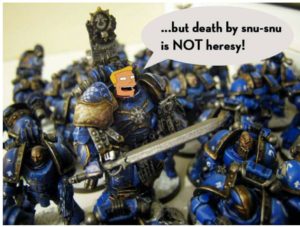
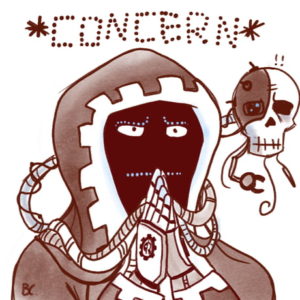

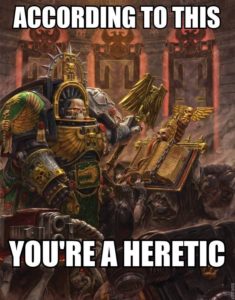
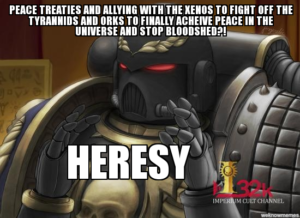
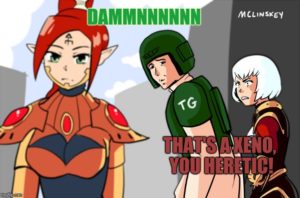


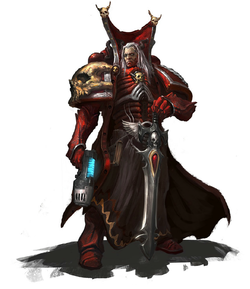


I feel like best in faction doesn’t really mean anything unless it is pure. If you are winning with a soup list then you are just the best in soup player.
I also think that pure best in faction would promote more variety of units. How many great Imperial units don’t get a look in because Castellans are so superb? More pure armies would mean less Castellans and then other units like Magnus and Land Raiders might get a look in.
It is also gives more prestige to best in faction and more obscure factions may get more play time.
As such I think that option 3 is the best and I think it would benefit the game, tournaments and the ITC to adopt it.
Agreed. Just like missions have a direct influence on units being taken this would also make a wider variety on the tables to be seen.
Also as people here at frontline that are testers keep saying; don’t take the internet word for what is the only and best way to run an army. This would lead to more experimental list I think.
I prefer option 3.
I think creating soup categories is fair. Best Imperium player is a soup category (and you can cast your own aspersions as required), but Best Astramiltarum player would be for pure Guard armies, maybe not counting the occasional assassin.
I very rarely mix my guard and marines together, and usually only ever run Knights alongside my admech. I prefer pure armies, and do so even in tournaments where I am at a disadvantage doing so.
Of course I look sideways at people who run Yarrick in non-Steel Legion armies… but I know I am to the far end of the Pure army Spectrum, and I don’t complain about mixed armies….I just know that I am “better” than those Heretics 🙂 It helps to have to moral high ground when you lose alot.
I think this would be pretty easy to quantify, as summoned units like assassins and demons aren’t written on your army list except as reinforcement points. This gives some competitive and thematic flexibility without sacrificing the way your army is built.
Chris, I think you did a solid job of presenting a balanced argument for the different considerations. I can certainly see both sides. Personally, I try really hard to run “fluffy” competitive lists, which often times has sisters, IG, or Blood Angels running alongside my Deathwatch… so it is, by meta-definition, Imperial ‘soup’. These tend to be more themey, fun games and hopefully makes for a more black-libraryish themed match. (I believe Deathwatch are just too select, being the paragons they are, to commit a vast array of kill-teams to one battle… so we will see allies!)
I can see changing requirements for a 50%+1 for viability reasons, or something equitable/comparable to this. If I were to be candid about the suggested options you present, I believe that the vast majority of 40k players are not really attuned to the need to change the current scoring system. Most top-tier competitive players that I know, watch, have met and have seen, I believe will still be competitive at top-tier with/or without soup lists because they are just that good.
Finally, it would really come down to this for me: Is there really that many people clamoring for this change? And if so, than I think it deserves a pretty serious look. Does the fact that you are writing this article mean that there are enough 40k players talking about this issue, that it merits a change… or is this the personal proclivities of a select few trying to moderate change over thousands of players that it doesn’t matter to?
Again, I applaud your efforts here, and look forward to what the community decides in the coming year!
Hey Lou, thanks for the response.
Your army in particular, I think, is a good example of how people’s dedication to a faction and desire to win combine. Yes, you have BA, IG, AS, knights, and many others as part of your toolbox, but each one is painted to look like your deathwatch. They are also designed to fill holes in your strategy left open by the nature of your book. I have zero issue with you playing your army to win, and applaud your efforts to keep a theme and stay as spiritually and visually close to your Deathwatch as you can.
Theme, however, is not what this article is trying to hash out with this article. What we are trying to figure out is the metric by which we measure talent in playing a particular faction when awarding best in faction. We are not trying to stop players from bringing mixed-faction armies, or trying to cast aspersions on players who are trying to win tournaments with the best combinations of units they have available across eligible factions.
And yes, you are correct, good players play well no matter the faction or combination, but it is also true that people who are trying to contend for the top spot in the ITC are not concerned with a best in faction award – which is at best a consolation prize for not taking the cake. Additionally, making good decisions on the table will only take you so far. There is a reason that players like Nick Nanavati didn’t bring Grey Knights to LVO. That issue is separate from what this article is trying to address.
So far as outcry is concerned, the number one issue that I get in feedback about the ITC right now is how faction awards are not represented properly. I get this from players around the country in public and private at events, and through private messages. There are many players who lose engagement when they realize that they aren’t competing for these awards under an even playing field. So far as a majority, that is hard to quantify.
I think I like a combo of 2 and 3, with the breakoff point being something high like 75%. Otherwise anyone who wanted to include a smaller faction like inquisition, assassins, or solo-non-castellan-knights could only qualify for BIF for soup.
BIF should be Solo Codex.
Multi Codex armies can still also be BIF, but a Guard/Knight/Blood Angel army would be the IMPERIAL faction. Same for Eldar & Chaos soup.
Just my 2 cents.
I like #2.
I am still stumping that Slaanesh Daemons, Khorne Daemons, Nurgle Daemons, Tzeetch Daemons, Kabals, Wych Cults, and Homoculi Covens, should all be considered different factions. For the most part, they all have unique units, stratagems, psychic powers, warlord traits, and relics. It is a bigger distinction than just a Chapter Tactic. There is a greater between Slaanesh and Khorne, Daemons than there is between Dark Angels and Blood Angels.
>There is a greater between Slaanesh and Khorne, Daemons than there is between Dark Angels and Blood Angels.
Is there, though? I mean, one of them is a T3/5++ daemon with close combat abilities that gets a bonus if there are twenty models in the unit, and the other one… is exactly the same thing.
Their Troops are very similar, yeah, but they get much less so once you start looking at the other FOC slots.
Is there much difference between an Imperial Guardsman and an Eldar Guardian? They are both T3 5+ and are shooty? Are Ork Boyz and Genestealres basically the same unit because they are both melee oriented and have the exact same size bonus rule? Is a Harlequin Troupe and a Pink Horror the same because they both are T3 and 4++? This is all a false equivalence trying to pigeon hole combat roles as defining a characteristic of a faction.
There is also a big difference between Bloodletters and Daemonettes. Bloodletters are worth fielding.
>Is there much difference between an Imperial Guardsman and an Eldar Guardian
Yeah but do they come from the same codex?
You’re trying to argue that we should subdivide some (but not all) codices up in factions. Your support for this is “they have different units.” I’m sorry if it’s hard to win with Slaanesh, I also really like Slaanesh and wish that it was better, but the fact that all of the Nurgle players are getting better rankings than you is not in itself sufficient reason to further-divide a game that already has literally dozens of factions in it.
Chaos can at least make an argument for spreading across the gods since, for example, you can have the nurgle keyword across daemons, chaos marines, and death guard codices. Same for tzeentch with daemons, chaos marines, and thousand sons. Dunno if khorne or slaanesh warrant it without their own ‘daemonkin’ codices.
> Yeah but do they come from the same codex?
So what is your argument here? Is it because Khorne and Slaanesh, units have role overlap they aren’t worth separating into factions? Is it because they are all from the same codex? I feel you are just moving the goal post.
I don’t think the physical codex makes a difference. Rules interaction wise mixing Drukhari sub-factions or Chaos Daemon sub-factions makes a soup detachment. It is the same effect as making an Adeptus Astartes Battlebrothers detachment with Space Wolves and Dark Angels.
I am arguing that Chaos Daemons and Drukhari, are an edge case in how we consider factions. Drukhari is the only sub-sub-factions currently being tracked in ITC. These two codices are just mini codices bundled together.
For the other codices in the game currently, the difference between Chapter Tactics is maybe a special character and a unique stratagem/relic/warlord trait. That faction mostly draws from the same pool of stratagems, relics, and warlord traits. These are not unique enough to track as separate factions. As they share majoritively the same units and rules.
ITC tracks extremely niche factions like Dark Mechanicus, Eldar Corsairs, or Renegade and Heretics. It also tracks Imperial Agents, which I guess you could make a primary with a bunch of assassins and inquisitors? It also tracks Ynnari which is just a Chapter Tactic faction keyword change that Battlebrothers different Eldar codices together, instead of lumping it together as Eldar soup.
If best in faction is just best-soup-with-34%-of-faction then just drop it – it adds very little to anything in that format. A poor consolation prize rather than a prize that players design lists for and aim for specifically.
Best in faction can have a couple of real benefits to the tournament scene but to deliver those benefits it does need to be somewhere near to pure faction
1. Something to aim at for all those players who just love their faction and would like to be able to compete for *something* without compromising on that.
2. To drive greater list diversity in tournaments, if best AdMech is for pure AdMech then the players trying to win it will not run a slight variation of the same Castellan list as those going after best AM.
Last time I was at WHW the best in faction awards were going for each individual faction and for best Imperium/Chaos. I think that works pretty well, although with the sheer numbers in the ITC best Aeldari might also be worth considering. Still got my best in faction sitting proudly on my shelf 🙂
I also agree that the awards lose meaning for not representing what they advertise. Better to scrap the individual factions in favor of ‘best Imperium’ etc. (while keeping the mono-faction book awards) than the set the false expectation that the winner is actually playing the faction they are being awarded for.
I would prefer Option 3,with Added super-factions (e.g. soup faction).
I could also live with option 2 if the threshhold is 75%. That way you could include 400 points of Allies like in Age of Sigmar. That would feel a Bit more like a best in faction than what we have now.
Your arguments cover my opinion very well.
Thanks for the kind words, and for the input!
As a newer player i was blown away when i read the article and saw you could win best in faction with 34%! I also dont think pure monofaction is reasonable. At least 50% is very kind, and 75% i dont think is unreasonable.
I’m of the “somewhere between 2 and 3” camp.
I don’t care about soup lists, it’s the nature of the game.
However, if you’re the best with your faction, you should totally be the best with primarily that faction.
I’m down for like 75+%.
I think there are good arguments for 2 and 3.
In favour of 2 it will be impossible to police the summoning mechanic. Even if 100% of your points are spent on a single faction at the list building stage you can still add in demons or assassins to dilute the purity of your list.
In favour of 3 is the simple fact that soup is soup. It is easy to jam an aux battalion into a knight list without breaking sweat. Arguably that one act completely turns on its head how the list plays and your unit selections. If you allow 25% you will never see a pure Knight list although you are likely to see a lot more pure Space Marine lists.
Sure, but I think that summoning and reinforcement points wouldn’t really matter since it isn’t written on your list. As long as your written list is pure, it wouldn’t really matter since you don’t HAVE to summon/use the reinforcement points, and summoning is more like an ability. I do see your concerns, though, and acknowledge that it could be gamed to a point.
I feel any threshold in option 2 would be somewhat arbitrary and option 3 is unrealistically rigid. Since this conversation is outside logistical barriers I think there is a 4th, more logical option. If a player’s score for BIF was their overall score multiplied by the % of their army that was each particular faction we could get some pretty interesting interactions. A pure list would get 100% of their points toward their faction’s BIF and a soup list that is 51% guard and 49% knights would get 51% of their points toward guard BIF and 49% towards knights BIF. In this way there would be no arbitrary hard cutoff of soup vs pure where people try to soup as much as possible without crossing the line, each % you invest in soup means you have to perform that % better to win BIF.
Thanks for the comment. While I appreciate the logic behind applying percentages, I think that your solution is much, much more complicated and harder to implement than all the others presented here. Many things would need to happen for this:
1. BCP would have to be re-written to allow for partial scoring and divvying up points in accordance to player-entered percentages (another feature that would require extensive restructuring to accommodate).
2. It puts a bigger burden on TOs to check percentages, where option three it is easy to tell if something is multi-faction or not.
I think it is a lot of effort for not very much gain, and would be extremely inconvenient and unpopular among the player base as a whole. Just my opinion.
I think we are micro analyzing an already amazing system. This ranking system doesn’t seem to have many if any flaws, but it seems because soup exists that people should be punished for utilizing what is available to them. You still have to create a list that is predominately one faction so I just don’t see a reason to punish people for following the guidelines of the game.
Also, what I believe will happen in this case is if you change the system and only allow Mono Dex armies to compete for “Best In Faction” you will see people going for “Best In Faction” at RTT’s or GT/Majors and get stomped by people who are going for “Best Overall” or just trying to win that event that they are at. Someone bringing 60% guard to an event with allies (Say a Castellan), will stomp a pure Guard list and we will then go back to lacking Disparity in the game. The ITC format will become more top heavy which seems to be what we are trying to avoid.
Just my thoughts!
Hey bud, thanks for the comment.
I disagree that the system is amazing, and would assert that the ranking system for best in faction is deeply flawed considering how little of a faction you must take in order to qualify under the scoring criteria. Mathematically, you only have to have one detachment at 34% and two other detachments at 33% to qualify for BIF. Additionally, because the system is set up so that your faction is determined by your largest detachment instead of cumulative points, you could have one IG faction of 34% and two detachments of Ad Mech at 33% each and still count as a IG player. That means that your 66% AdMech army will count towards your IG score. That seems like a pretty big flaw, wouldn’t you agree?
And yes, if you want to compete for BIF, you would have to choose to play on what would be ‘hard mode’ for some books. You would have to make a choice between winning the tournament or scoring high for your faction, but that’s only Maybe. RTTs are the wild west, and pure faction armies can still win them because of how pairings work in just three rounds. There is also the fact that there are plenty of events now where you could try to max out scores for either best overall or BIF points. It all comes down to what you think is more important: winning the tournament/ITC or going for an ITC BIF award. The disparity already exists in the game, and it will always exist in the game, but we may as well make it fair.
I would also argue that there is more satisfaction doing well with something considered underpowered than there is with something like a soup list. That isn’t meant to be an insult – no one (especially me) is advocating for no soup armies allowed in 40k, I am only talking about how misleading the BIF awards are now under the current system. It is a tournament. Play to win. Use your tools, but prioritize what you are trying to win. As it is right now, a best in faction award is pretty meaningless for all but the no-ally factions.
Personally I like option 3, with additional awards for soup factions (Imperium, Aeldari, Chaos, etc.). The award is called “best in faction” after all, its kind of right there in the name. This change won’t take away wins or ITC rankings and players are still able to take soup armies to compete, but its an award that recognizes those players who choose to play their single faction of choice.
Having said that, I think the logistics of this will be a hurdle because, as you said, it requires the honor system. TOs will need to do some checking at events, there might have to be periodic spot checking, and at the end of the year the top players in each faction will have to be verified somehow. But, we can solve this if the change is made.
Thanks for the comment, Mark. I think that the honor system critique comes a bit late. We already have an honor system. Players enter their own faction, and have for years under this system. Players competing for BIF will be watching their competition closely. Many of them are friends or are closely associated by reputation. I have little doubt that the system would self-police pretty well aside from some hardcore collusion.
I am for option 3. Its a choice the player makes, if you play soup you should compete for the prize of best soup. If you play codex X then you should compete for the prize of best codex X.
Ideally I think #2 is the best compromise but the hardest to police. Although if possible the threshold should be high ~75% of pts should be in a single faction.
From a practice standpoint #3 is probably the easiest to implement now until an automated system to check player faction is available. The honour system doesn’t work and I’ve seen and been to enough events where players have selected the wrong faction as their primary.
A soup option for IMPERIUM/ CHAOS/ELDAR etc is fair. I was disheartened at seeing the best IG lists being only partial IG and fairly repetitive compared to what the codex has to offer. This would reward those who try to make the most of a codex without cherry picking to fill the obvious pitfalls of their faction.
Thank you for this article. This is an issue dear to my heart and I feel that I need to add my opinion to the discussion. I play irregularly and can only travel to a handful of events. Winning the ITC, or even placing high in it has never been something I’ve wanted to do, but also something I could mathematically could never do, because of my inability to participate in lots of large events. I am a player that plays for the love of the game first and for competition second. Sure, I play to win, winning is fun, but I always set my own parameters of victory. Typically, that parameter is to play a PURE khorne army and do as best as I can.
When KDK were still a thing, I went all-in. Playing for best faction for KDK back in 2015-2016 was an amazing time that saw me actively promote the ITC in my area. I felt like I was competing against other players around the globe who were all trying to do the exact same thing: take skulls for Khorne. I even managed to do pretty well at it in 2015, with good placings at local events, Adepticon, and 5th at the NOVA Open. Due to my schedule I could not attend the LVO, and another servant of khorne won best KDK, pulling just ahead of me due to the sheer amount of points LVO is worth. I knew it would happen. I didnt even mind. I was happy for the victor. But then, I saw his list. I mean no disrespect for this player. He played inside the rules and won. But from the perspective of a pure khorne player, his list hurt me to view. He won best KDK with a list that was had nearly 900 points of psykers in it. I am very happy thhat this player did well, but in my opinion that was NOT a KDK list. We were NOT competiting with the same goal in mind, and that list had NO business being awarded best KDK. Again, I speak purely from a fluff point of view. To me, best in facttion awards are for those people who truly just want to play their single faction and are generally not the same people as those going for the overall ITC goal, but those who want to play locally and compete globally with other like minded people who want to claim the title as the best with their particular single-faction army. Please, I implore you, make the best in faction awards for the ITC only go to those with Single-faction army lists. Thank you for taking the time to read my thoughts on this matter.
Sincerely,
-Horton
Posted this on FLG
Thank you for this article. This is an issue dear to my heart and I feel that I need to add my opinion to the discussion. I play irregularly and can only travel to a handful of events. Winning the ITC, or even placing high in it has never been something I’ve wanted to do, but also something I could mathematically could never do, because of my inability to participate in lots of large events. I am a player that plays for the love of the game first and for competition second. Sure, I play to win, winning is fun, but I always set my own parameters of victory. Typically, that parameter is to play a PURE khorne army and do as best as I can.
When KDK were still a thing, I went all-in. Playing for best faction for KDK back in 2015-2016 was an amazing time that saw me actively promote the ITC in my area. I felt like I was competing against other players around the globe who were all trying to do the exact same thing: take skulls for Khorne. I even managed to do pretty well at it in 2015, with good placings at local events, Adepticon, and 5th at the NOVA Open. Due to my schedule I could not attend the LVO, and another servant of khorne won best KDK, pulling just ahead of me due to the sheer amount of points LVO is worth. I knew it would happen. I didnt even mind. I was happy for the victor. But then, I saw his list. I mean no disrespect for this player. He played inside the rules and won. But from the perspective of a pure khorne player, his list hurt me to view. He won best KDK with a list that was had nearly 900 points of psykers in it. I am very happy thhat this player did well, but in my opinion that was NOT a KDK list. We were NOT competiting with the same goal in mind, and that list had NO business being awarded best KDK. Again, I speak purely from a fluff point of view. To me, best in facttion awards are for those people who truly just want to play their single faction and are generally not the same people as those going for the overall ITC goal, but those who want to play locally and compete globally with other like minded people who want to claim the title as the best with their particular single-faction army. Please, I implore you, make the best in faction awards for the ITC only go to those with Single-faction army lists. Thank you for taking the time to read my thoughts on this matter.
Sincerely,
-Horton
I 110% agree with Horton!!!!
PLEASE ITC!! Just do the 3rd option as Abuse Puppy says, make Choas, imperium faction awards for the soupers but give the people who play by the fluff something to realistically aim for!
Hey all – Really want to chime in here.
Best in Faction is definitely something lots of folks shoot for. It gives the people in the game who like to keep their list range bound something to go for. I always love when events award for it too.
That being said I’d suggest something like the following:
Create 4 “best in faction” awards that are actually worth something. Imperium, Chaos, Aeldari and Xenos. These would also function as runner up prizes for the overall. You don’t have to change anything. Super easy to track. (winning the ITC should make it so you cannot win one of these). It also makes it so that there’s more to compete for at the high end of play – right now it’s all or nothing.
Then – take the existing best factions and make them for “pure” players. Monofaction builds. Recognize them with a certificate or something else low effort. Restrict it to so that all units in the army must share at least on keyword excluding Imperium. Also easy to track.
Granted this won’t satisfy the truly puritanical players (you can run marine soups, demon soups, etc) But it still puts the game on hard mode for most factions and gives the mono builds something to go for.
Cheersh.
*Restrict it to so that all units in the army must share at least on keyword excluding Imperium, Chaos, Aeldari and [Xenos]